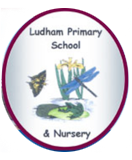Computing
INTENT
At Ludham Primary School and Nursery, we are DIGITAL INNOVATORS! We want our children to understand the potential of technology and start to build computing skills for the future. We want them to become digital creators, using technology to support other areas of their work and lives, and also to understand the responsibilities of being digital consumers on their time, relationships and wellbeing. We know the digital workplace is continuously evolving and want them to grow up wanting to a part of that as software engineers, video game designers, web developers or IT consultants. At Ludham, our Computing curriculum strives to develop resilient, reflective, creative and independent learners. It gives space for children to become “computational thinkers”, tackling complex problems, making mistakes and learning from them. It also engages our children, through the creative use of technology, to prepare pupils for the demands of the 21st century and the technological world that awaits them in the future. As well as the huge potential of technology, we teach our children to understand the challenges and problems it can create. We teach them to become good digital citizens, to know how to stay safe and keep others safe online, to be aware of the need to test out what and who they see and the importance of what they share in creating their own digital footprint.
IMPLEMENTATION
- At Ludham, we follow the ‘Teach Computing’ scheme of work but incorporate other schemes to best suit the needs of our children.
- Computing units are categorised into elements of Digital Literacy, Computer Science and Information Technology.
- Children complete computing units half-termly, but digital literacy is embedded in all subjects and is used on a daily basis to enhance and support the learning of other curriculum areas.
- The school uses a suite of core applications linked to the scheme, which enable children to develop and progress their skills through-out school.
- Topics are blocked to allow children to focus on developing their knowledge and skills, studying each topic in depth.
- Children have access to iPads to support all areas of the curriculum.
- In Computing lessons, children use devices from the Computing Suite which allows them to practice a variety of skills including mouse and keyboard skills.
- Teachers follow a clear progression of skills which ensure all pupils are challenged in line with their year group expectations and are given the opportunity to build on their prior knowledge.
- To support teaching, staff access a range of resources and planning including Teach Computing, Scratch and more.
- Our Assessment is used to inform future practice.
- The role of parents is recognised and they are involved in understanding how to keep their children safe at home.
IMPACT
Staff ensure that skills build on those that have been attained in previous years to consolidate and build on them as they move through school. Families at our school use technology responsibly, in line with the school’s acceptable use policies. Many parents engage with the school’s social media channels to keep up-to-date with developments that are happening in school. Each year, a selection of children from Upper Key Stage 2 are chosen to become Digital Leaders. These children are trained to support children that may encounter issues online. They hold informative assemblies for children, aid in data collection, push school initiatives and report any issues that they are told to a member of staff.
All children from Nursery to Year 6 have access to a range of technology and are able to develop many different computing skills. Where possible computing skills are linked to learning across the curriculum with computing having deep links with mathematics, science and design and technology. We use programming and coding to help pupils learn computer science and interact with the digital world with confidence. E-safety is an integral part of our computing provision. Children also have the opportunity to use programmes such as Word and PowerPoint to present pieces of their own work. At Ludham children have access to iPads, laptops, cameras, programmable robots and classroom touchscreen boards.
Ludham children are taught to be responsible competent, confident and creative users of information and communication technology and it is expected that the children will have the skills and understanding necessary to take an active part in a digital world.
By the end of Year 6 - End Points
The key assessment criteria for computing have been devised in such a way that they can be applied to allow teachers to assess how well children are developing as computer users and digital innovators. Teachers at Ludham may wish to supplement these key assessment criteria with other criteria if they feel that this adds value.
In devising the key assessment criteria, consideration has been given to what is considered age appropriate in line with the key stage programmes of study.
These have been tested and evaluated by class teachers.
There is no suggestion that this is the only ‘correct’ sequence; but rather a suggestion to help teachers plan and assess.
Knowledge Organisers






 Cycle B – Summer 1 – Herons
Cycle B – Summer 1 – Herons
 Cycle B – Spring 1 – Herons
Cycle B – Spring 1 – Herons





